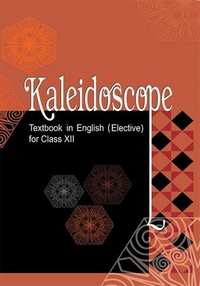Advertisements
Chapters
1: I Sell my Dreams
2: Eveline
3: A Wedding in Brownsville
4: Tomorrow
5: One Centimetre
Poetry
1: A Lecture Upon the Shadow
2: Poems by Milton
3: Poems by Blake
4: Kubla Khan
5: Trees
6: The Wild Swans at Coole
7: Time and Time Again
8: Blood
Non - Fiction
1: Freedom
2: The Mark on the Wall
▶ 3: Film-making
4: Why the Novel Matters
5: The Argumentative Indian
6: On Science Fiction
Drama
1: Chandalika
2: Broken Images

Advertisements
Solutions for Chapter 3: Film-making
Below listed, you can find solutions for Chapter 3 of CBSE NCERT for English - Kaleidoscope Class 12.
NCERT solutions for English - Kaleidoscope Class 12 3 Film-making Stop and Think [Pages 151 - 159]
What childhood memories does the author recollect that had a bearing on his later involvement with filmmaking?
What connection does the author draw between filmmaking and conjuring?
What is the nature of the first impressions that form the basis for a film?
Which art form is film-making closest to? What is the reason for the similarity?
Quite often a film made out of a book is not very successful. Discuss.
What, according to Bergman, is the relationship between a filmmaker and his audience?
What is the story of the Cathedral of Chartres and how does the author relate it to his profession?
What are some of the flaws of the world of filmmaking today?
NCERT solutions for English - Kaleidoscope Class 12 3 Film-making Understanding the Text [Page 161]
Pick out examples from the text that show Bergman’s sensitivity to sensory impressions which have made him a great filmmaker.
What do you understand of the complexity of the little invisible steps that go into the making of a good film?
What are some of the risks that film-making involves?
What misgivings does Bergman have about the contemporary film industry?
Compare Bergman’s views about making films out of books with that of Umberto Eco’s.
NCERT solutions for English - Kaleidoscope Class 12 3 Film-making Talking about the Text [Pages 161 - 162]
According to the author, split-second impressions form a ‘mental state, not an actual story, but one abounding in fertile associations and images’.
Compare this with Virginia Woolf’s experiment with the stream of consciousness technique in ‘The Mark on the Wall’.
Bergman talks about the various influences in his life including his parents and his religious upbringing. To what extent are an individual’s achievements dependent on the kind of influences he or she has had in life? Discuss.
NCERT solutions for English - Kaleidoscope Class 12 3 Film-making Appreciation [Page 162]
Autobiographical accounts make interesting reading when the author selects episodes that are connected to the pursuit of excellence. How does this apply to Ingmar Bergman’s narration of the details of film-making?
Comment on the conversational tone of the narration. Compare this with the very informal style adopted by Umberto Eco in the interview.
NCERT solutions for English - Kaleidoscope Class 12 3 Film-making Language Work [Page 162]
Vocabulary
Find out and write down the definitions of the following terms used in the film industry
script -
project -
montage -
flashback -
stage -
prop -
footlights -
NCERT solutions for English - Kaleidoscope Class 12 3 Film-making Things to do [Page 164]
Think of a particular episode that could be enacted. Now imagine that you are a scriptwriter and write the screenplay for the first ten minutes of the episode, in the following format
| Title : | |
| Actors : | |
| Scene - 1 | |
| Description | Dialogue |
The column ‘Dialogue’ would contain the words to be actually spoken by the characters. ‘Description’ would include instructions regarding stage props, the position of lights, movement of actors, and so on.
Solutions for 3: Film-making

NCERT solutions for English - Kaleidoscope Class 12 chapter 3 - Film-making
Shaalaa.com has the CBSE Mathematics English - Kaleidoscope Class 12 CBSE solutions in a manner that help students grasp basic concepts better and faster. The detailed, step-by-step solutions will help you understand the concepts better and clarify any confusion. NCERT solutions for Mathematics English - Kaleidoscope Class 12 CBSE 3 (Film-making) include all questions with answers and detailed explanations. This will clear students' doubts about questions and improve their application skills while preparing for board exams.
Further, we at Shaalaa.com provide such solutions so students can prepare for written exams. NCERT textbook solutions can be a core help for self-study and provide excellent self-help guidance for students.
Concepts covered in English - Kaleidoscope Class 12 chapter 3 Film-making are Film-making, Grammar, Parallelism, Syllables, Figures of Speech, Punctuation, Parts of Speech, Rhyme Scheme, Pronunciation, Vocabulary, Capitalization, Pronoun, Direct-Indirect Speech, Verb, Types of Sentences, Idioms and Phrases, Tense, Orthography, Clauses, Writing Skills, Article Writing, Speech Writing, Report Writing, Note Making, Notice Writing, Letter Writing, Reading Skills, Unseen Passage Comprehension, Unseen Poem Comprehension.
Using NCERT English - Kaleidoscope Class 12 solutions Film-making exercise by students is an easy way to prepare for the exams, as they involve solutions arranged chapter-wise and also page-wise. The questions involved in NCERT Solutions are essential questions that can be asked in the final exam. Maximum CBSE English - Kaleidoscope Class 12 students prefer NCERT Textbook Solutions to score more in exams.
Get the free view of Chapter 3, Film-making English - Kaleidoscope Class 12 additional questions for Mathematics English - Kaleidoscope Class 12 CBSE, and you can use Shaalaa.com to keep it handy for your exam preparation.
